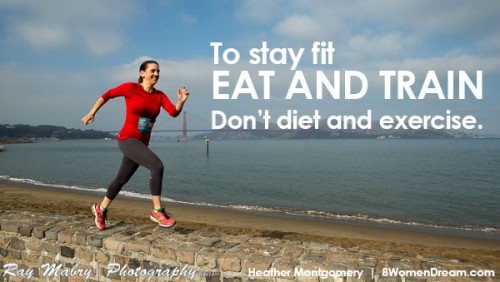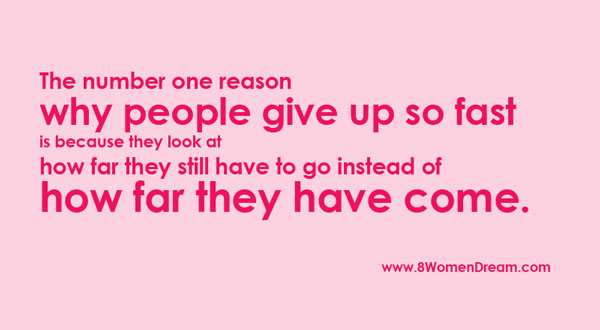If you mention a goal of weight loss or fitness, one of the first questions asked is “What diet are you on?” The focus of the billion dollar weight loss industry is taking it off. Now we know the trick of any weight loss is literally all in our minds.
At the beginning of my own weight loss and fitness path it was all about the food. Lower calories equals lower weight. The math supports it and it does work.
When you think of “diet” you probably think short term. Short term changes, short term results.
This is the point of my advice “do not diet”. No one considers being on a diet forever. The reality is that once you start a diet, maintaining that weight loss means lower calories forever.
Sandra Aamodt in her TED talk, “Why dieting doesn’t usually work” discusses the adjusted calories a person who has experienced weight loss will have to maintain to keep it off, compared with another person at the same weight.
250-400 calories less very day. Forever.
I had read similar research about 40 pounds into my own weight loss. I was a little annoyed that I would have to take this into consideration for the rest of my life.
Thank our brains for that. Specifically the hypothalamus.
Your brain also has its own sense of what you should weigh, no matter what you consciously believe. This is called your set point, but that’s a misleading term, because it’s actually a range of about 10 or 15 pounds. You can use lifestyle choices to move your weight up and down within that range, but it’s much, much harder to stay outside of it. The hypothalamus, the part of the brain that regulates body weight, there are more than a dozen chemical signals in the brain that tell your body to gain weight, more than another dozen that tell your body to lose it, and the system works like a thermostat, responding to signals from the body by adjusting hunger, activity and metabolism, to keep your weight stable as conditions change. (Resource: Sandra Aamodt: Why dieting doesn’t usually work)
An interesting concept the weight loss industry does not advertise is that most of those will gain the weight back. Add to that another sad fact that 40% will gain all the weight back, plus a few more pounds.
Then why do we still do it?
Prevention is now proving to be the best medicine when it comes to a lifetime of healthy weight maintenance. That would be perfect. Most of us dealing with maintaining a healthy weight in our 40’s.
“If we had a time machine, it would be the world’s best weight-loss program.”
– Dr. Yoni Freedhoff
Sandra Aamodt suggests using our hunger to drive mindful eating. The idea is the goal of being aware of our actual hunger and being driven to feed only that.
Not eating from stress, not by craving, not by the dessert the table next to you ordered.
Sandra Aamodt talks about two different eaters.
Psychologists classify eaters into two groups, those who rely on their hunger and those who try to control their eating through willpower, like most dieters. Let’s call them intuitive eaters and controlled eaters. The interesting thing is that intuitive eaters are less likely to be overweight, and they spend less time thinking about food. Controlled eaters are more vulnerable to overeating in response to advertising, super-sizing, and the all-you-can-eat buffet. And a small indulgence, like eating one scoop of ice cream, is more likely to lead to a food binge in controlled eaters. Children are especially vulnerable to this cycle of dieting and then binging. Several long-term studies have shown that girls who diet in their early teenage years are three times more likely to become overweight five years later, even if they started at a normal weight, and all of these studies found that the same factors that predicted weight gain also predicted the development of eating disorders.
I can honestly admit that I am a controlled eater. I have eaten when I’m not hungry. I still occasionally add a dessert or late night snack, when all I want is a certain taste experience, not that I’m hungry at all.
The difference now is that instead of my inner monologue beating me up, it’s my digestive system. My belly is quite aware of the food I put in it. It gets upset if I eat processed food, and really acts up when I overeat.
This is the concept of mindful eating that Sandra Aamodt is describing.
How do you know you are practicing mindful eating?
Here are a few clues it has taken me a while to put together for myself. It just took me a while to admit it.
- you find yourself picking up food to eat, while you are distracted by something else (like TV)
- grabbing food out of habit, usually at a certain time of day
- eating anything when you are already full
Do Not Diet
When you consider the damage done by short term low calorie diet, you have to ask if we can just ban that word from our vocabulary. Instead lets embrace healthy eating, mindful eating, eating to fuel our lives. Changing your lifestyle around eating and fitness makes a difference long term.
What do you think? Your turn to add to the conversation in the comments.
Have you ever had a long lasting positive result from a diet?
Go get your fit on – Heather

Heather Montgomery is a fitness writer, triathlete, and serial entrepreneur who is devoted to sharing what she has learned about becoming a triathlete after age 40. She uses her Metabolic Training Certification to help other women struggling to get fit in mid-life. She lives and trains in Santa Rosa, California, the new home of the Ironman triathlon. You can find her biking the Sonoma County wine trails.
Note: Articles by Heather may contain affiliate links and will be compensated if you make a purchase after clicking on an affiliate link.





